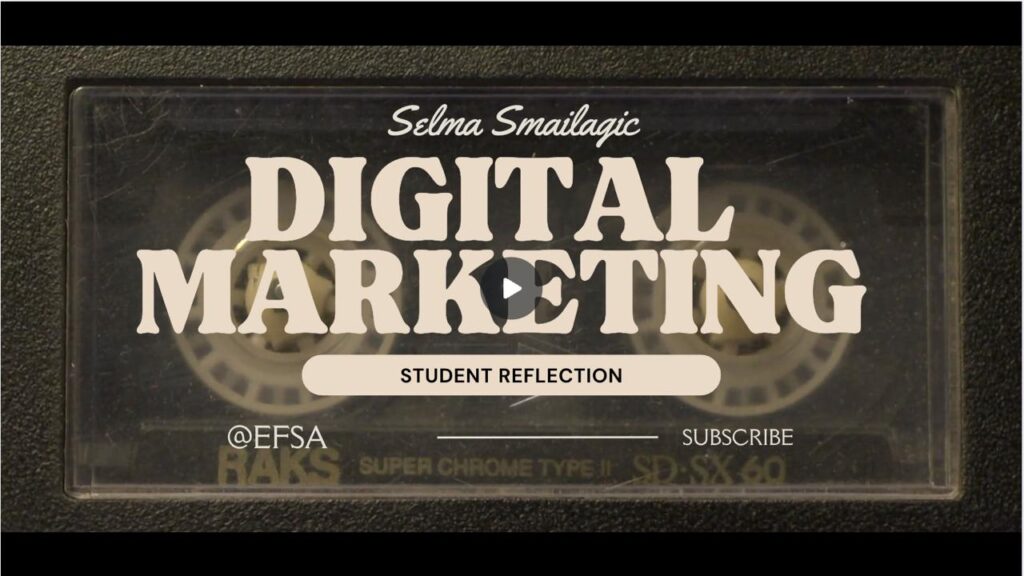
Part 1 – Personal Reflection on the DDCE Module
Before taking this course, I didn’t fully appreciate how complex digital marketing really is. Many people assume it’s something anyone can do, but I’ve learned that it involves much more than just making social media posts or running ads. There’s a lot happening behind the scenes, from metadata and tags to SEO strategies that make websites and campaigns effective, even if we don’t notice it as users.
This module opened my eyes to how technical and detailed digital marketing can be. Simple changes in code or how content is structured can greatly influence how well something performs online. I found this part particularly interesting, how digital content is tailored for both human viewers and algorithms to make sure it reaches the right audience.
Digital marketing isn’t just about paid ads, but an organic reach through proper SEO and thoughtful content planning plays a huge role too. Whether it’s a blog or a booking website, being visible online takes real strategy and constant adjustment. The course also emphasized the importance of having a clear vision and a very detailed plan. No detail is to be looked over when planning a campaign, treat it as if it will be given to someone with no knowledge, full pack instructions. It’s not enough to just want more traffic, but you need to know how to get it.
What surprised me most is how much of digital marketing can be applied in everyday life, not just in business. Even a personal Instagram post can benefit from some of the techniques we learned. This makes digital marketing feel like the most interactive and social branch of marketing.
Overall, this course changed my perception of marketing. It’s not as simple as I once thought, and I now understand how much strategy and effort goes into making a campaign succeed. I’m leaving this module with a deeper respect for digital marketing and a strong interest in learning even more.
Part 2 – AI Perspective on the DDCE Module and Digital Marketing as a Field
As an AI language model, I don’t experience learning in the human sense, but I’ve been trained on a vast amount of data that includes academic materials, industry insights, and public discussions about digital marketing. Based on that, I can offer a perspective on what digital marketing is, how it is commonly perceived, and how its reputation could be better aligned with its actual complexity.
Digital Marketing: A Deep and Evolving Discipline
Digital marketing is often seen as a fast-moving, trend-driven field—and while that’s true to some extent, it’s also a deeply strategic discipline that blends creativity, data analysis, technical skills, and user psychology. It requires professionals to understand algorithms, develop strong content strategies, track metrics, optimize campaigns in real time, and adapt quickly to platform changes.
Beyond paid ads and social media, digital marketing encompasses search engine optimization (SEO), email marketing, affiliate strategies, influencer partnerships, data analytics, customer journey mapping, and much more. It also involves understanding digital behavior patterns and knowing how to guide users from awareness to conversion.
Common Misconceptions
One of the biggest misconceptions is that digital marketing is easy or something “anyone can do.” This belief stems from the visibility of the final product—like social media posts or Google ads—while the technical and strategic work behind the scenes remains largely invisible to the average person. As a result, digital marketing is often undervalued, especially compared to more “traditional” disciplines in business or tech.
Another misconception is that digital marketing is just about “getting clicks” or “going viral.” While visibility is important, real digital marketing success is measured through deeper metrics: engagement quality, customer retention, lead nurturing, brand sentiment, and return on investment (ROI). These are all outcomes of thoughtful, well-researched strategies—something the public often doesn’t see.
Public Perception and Its Impact
Because of these misconceptions, digital marketing professionals sometimes struggle to be taken seriously, especially in industries where leadership lacks digital literacy. This can lead to underfunded campaigns, unrealistic expectations, or hiring underqualified individuals based on the belief that digital marketing doesn’t require specialized knowledge.
There’s also a tendency to confuse “using digital platforms” with “doing digital marketing.” Just because someone can use Instagram or boost a post doesn’t mean they understand audience segmentation, A/B testing, or the technical aspects of SEO.
How to Raise Awareness and Educate the Public
To address these issues and elevate the field’s reputation, a few things could help:
Realistic Narratives – Pop culture and media often glamorize digital marketing as just “going viral” or creating flashy content. A more realistic, nuanced representation could help people understand the field’s true depth.
Education at All Levels – Digital marketing should be introduced more seriously in schools, universities, and professional development programs—not just as a “soft skill,” but as a legitimate business discipline that requires technical and strategic understanding.
Transparency in the Industry – Agencies and professionals can do more to show what goes on behind the scenes. Case studies, campaign breakdowns, and open discussions about failures and learning experiences can help demystify the work.
Certifications and Standards – Widespread use of certifications (from platforms like Google, HubSpot, or academic institutions) can help set clearer expectations about what a skilled digital marketer actually knows.
Public-Facing Content – Creating content that educates non-marketers—like small business owners or students—can help bridge the knowledge gap. Simple videos, blog posts, or infographics explaining how SEO works or how ad targeting is done could make a big difference.
Part 3 – Amalgamated Personal and AI Content
Before starting the DDCE module, I had a fairly simple view of digital marketing. Like many people, I assumed it was mostly about making social media posts, running some ads, and trying to “go viral.” However, as the course progressed, I quickly realized just how much depth and technical skill the field actually requires.
Digital marketing isn’t just about being present online, t’s about being intentional. From how websites are structured, to how metadata and tags are written, to how search engine optimization (SEO) works behind the scenes, every detail matters. The course showed me that even small adjustments in code or layout can significantly impact visibility and performance. These hidden elements, which most users never notice, are what often determine whether a campaign succeeds or fails.
One of the most valuable lessons I learned is how much strategy and planning goes into every aspect of a campaign. It’s not enough to simply say, “I want more traffic.” You need to have a clear plan, know your audience, select the right tools, and continuously monitor and adapt. This kind of structured thinking reminded me that digital marketing is both an art and a science, where creativity must meet data-driven decision-making.
The AI-generated insights added further perspective to this. It emphasized how digital marketing is often misunderstood or undervalued due to its visibility. Many people confuse being active on social platforms with actually doing digital marketing. But using Instagram and creating a strategic, goal-driven marketing campaign are two very different things.
There are also widespread misconceptions that digital marketing is easy or something “anyone can do.” The truth is that it involves a deep understanding of algorithms, audience behavior, analytics, and content strategy. While digital tools make the platforms accessible, effective digital marketing requires experience, training, and a strong grasp of both technical and psychological elements.
The public perception of digital marketing tends to focus on surface-level outcomes—such as viral posts or influencer partnerships—without recognizing the extensive behind-the-scenes work. As a result, the field often lacks the respect it deserves, especially in industries that are less digitally savvy.
This raises an important point: there is a need to better educate people about what digital marketing truly entails. From integrating it more thoroughly into educational curriculums to promoting certification programs and transparent industry case studies, there’s much that can be done to improve public understanding. Agencies and marketers could also help by showing their work processes, highlighting the analytical side of campaigns, and sharing both successes and failures more openly.
What I found especially interesting is how applicable digital marketing strategies are in everyday life. Even something like a personal Instagram post can benefit from basic principles we learned—like optimal timing, hashtag strategy, or visual hierarchy. That’s what makes digital marketing so unique: it’s not only a professional discipline but also a practical life skill in the digital age.
In conclusion, this module has given me a deeper appreciation for digital marketing—not just as a career path, but as a powerful tool that shapes how we connect, share, and do business in the modern world. By combining the academic and technical knowledge from the course with the broader AI perspective, I now see digital marketing as one of the most dynamic, complex, and socially impactful areas of modern communication. It’s far more than just ads and algorithms; it’s a reflection of how we engage with the world—and the better we understand it, the more effective and responsible we can be in using it.
Video reflection on DCCE module
